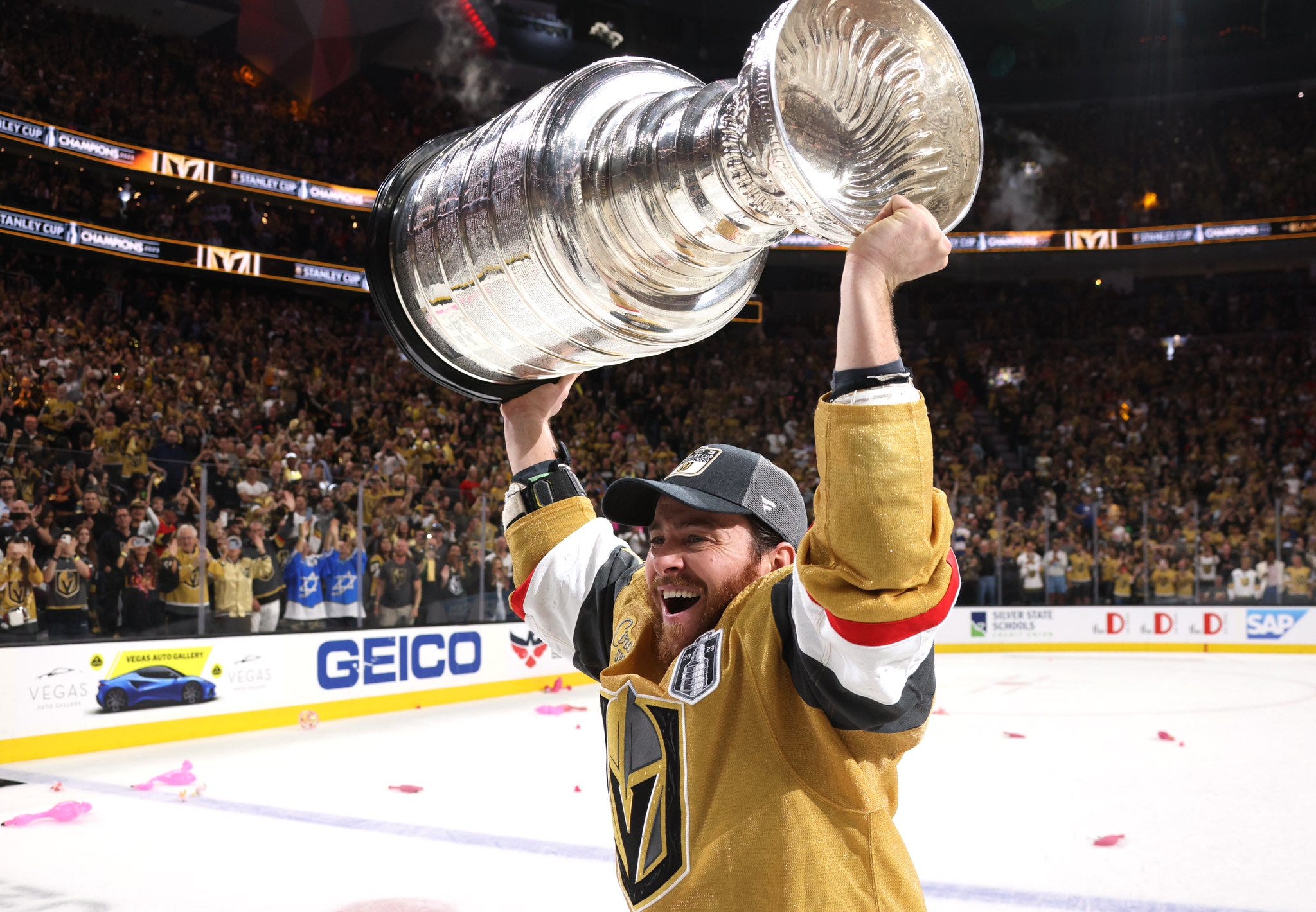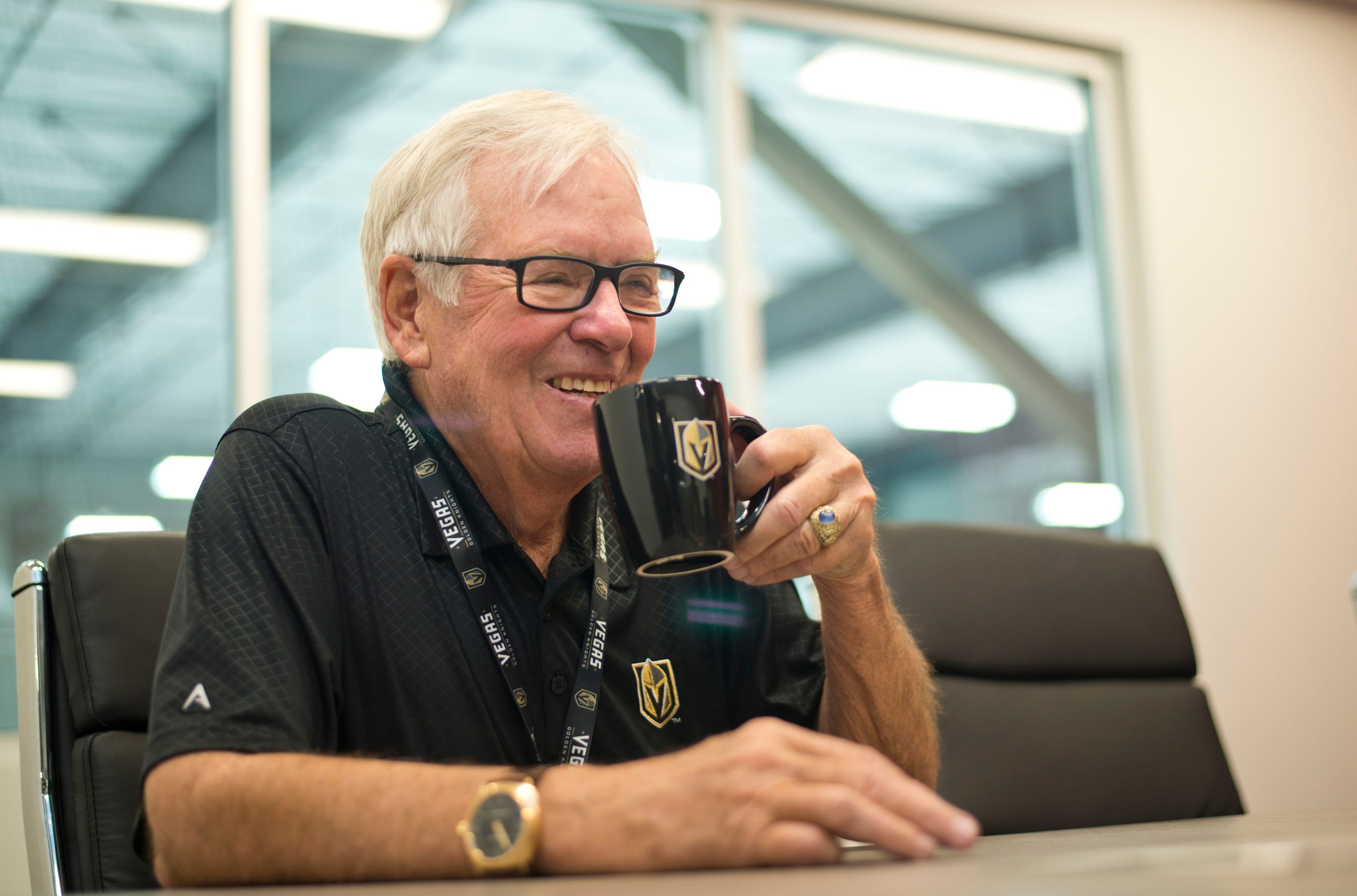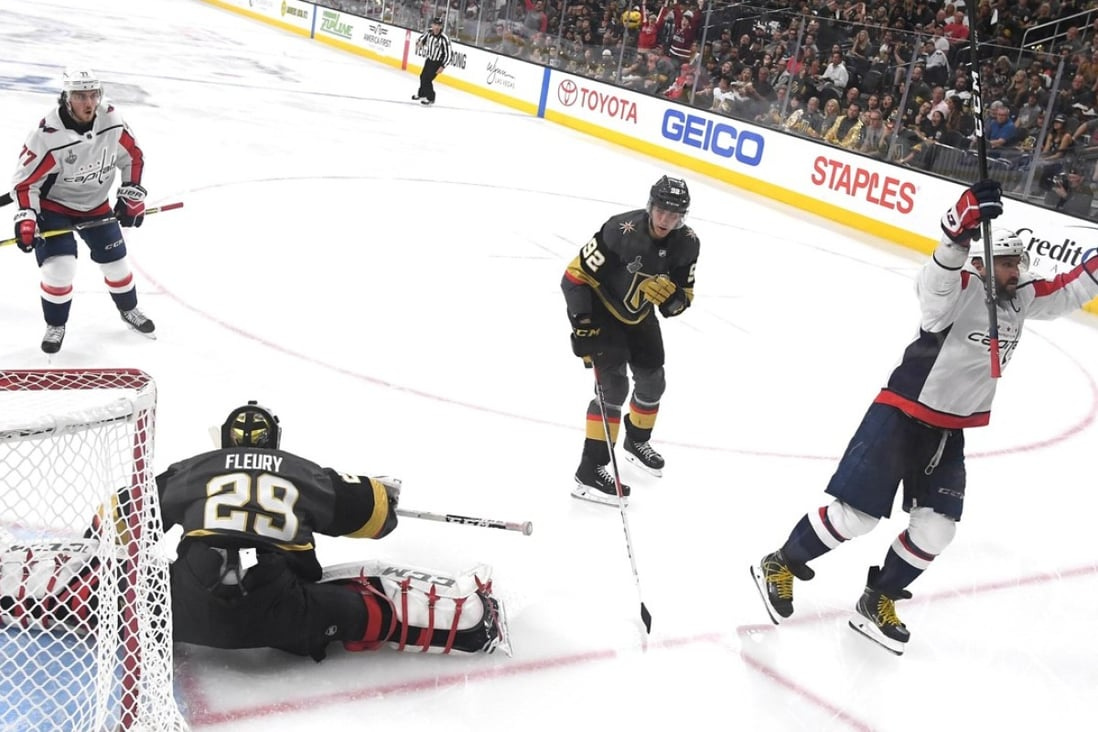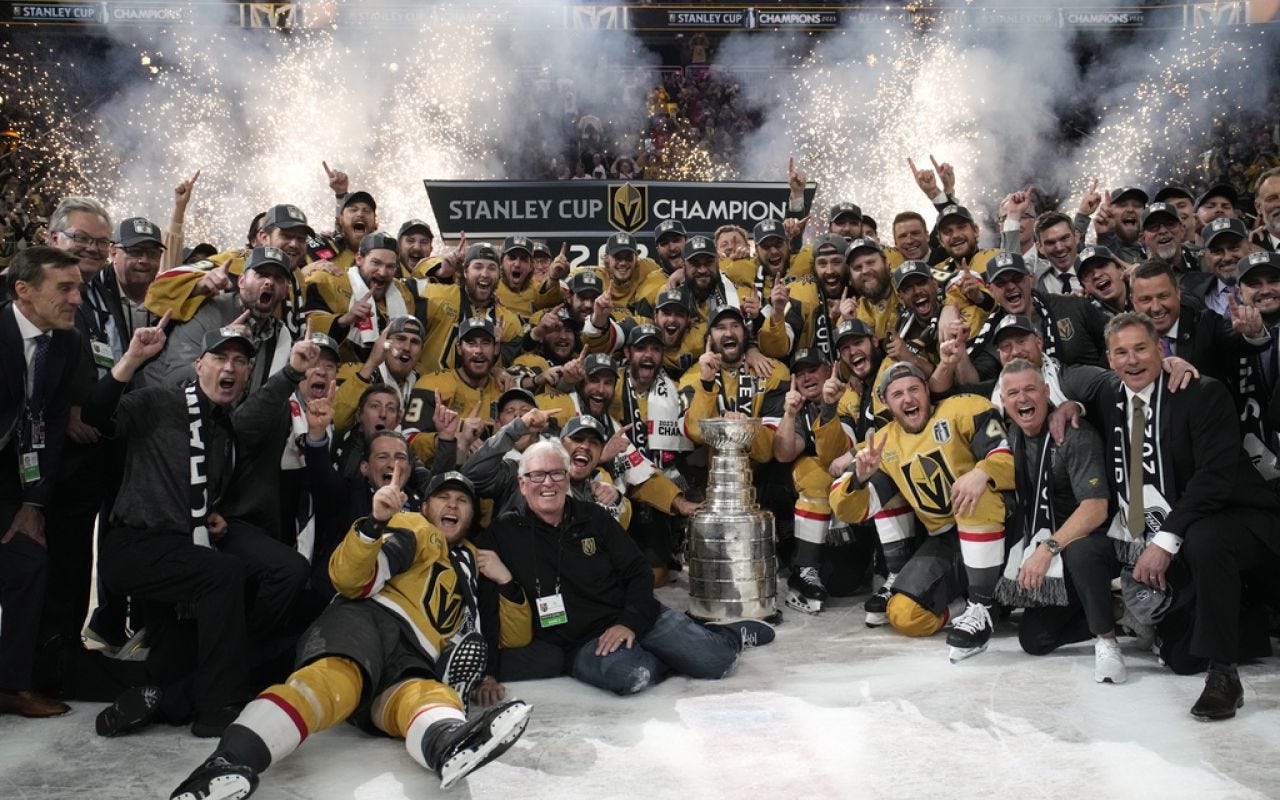How The Vegas Golden Knights Became A $1 Billion NHL Franchise In Just 6 Years
Huddle Up is a 3x weekly newsletter that breaks down the business and money behind sports. If you are not already a subscriber, sign up and join 100,000+ others who receive it directly in their inbox each week. Today At A Glance:The Vegas Golden Knights just won the Stanley Cup, reaching the mountaintop of the NHL in just six seasons of existence. So today we’ll take a look at the business of the Golden Knights, including how the organization built a consistent contender from scratch and why their valuation has doubled ($500M to $1B) virtually overnight. This newsletter is also available via podcast on Apple or Spotify. Enjoy! This Newsletter is Sponsored By ButcherBox!I’ve been ordering from ButcherBox for a few years now, and it’s the single best solution I’ve found to save time while guaranteeing the quality of your food. ButcherBox delivers 100% grass-fed grass-finished beef, free-range, organic chicken, humanely raised pork, and wild-caught seafood directly to your doorstep. Yes, it’s literally that easy — and it tastes incredible! So ditch the butcher lines today and guarantee the freshness of your meat with ButcherBox. And here’s the best part: If you sign up today, ButcherBox is offering all Huddle Up readers 2 lbs of ground beef for FREE every time they order over the next year. So sign up using the link below, and everyone in your household will thank you later. Friends, In 2015, when Bill Foley submitted a bid to bring an NHL expansion franchise to Las Vegas, many people questioned whether ice hockey would work in the Nevada desert. This was before the Las Vegas Raiders moved from Oakland into a new $2 billion state-of-the-art facility near the Las Vegas Strip. And despite Nevada having a population of more than 3 million people, the state had just 1,382 registered hockey players — and only 40% (552 players) of those 1,382 players were 18 or younger. But Bill Foley didn’t care what people thought. He committed to a $500 million expansion fee and made a bold, inspiring promise: “Playoffs in three. Cup in six.” And that’s precisely what the Vegas Golden Knights have done six years later. They are now one of the NHL’s most lucrative markets, selling out games every night and watching their valuation increase from $500 million in 2017 to $1 billion today. Bill Foley grew up on a ranch in Texas and was eventually commissioned as a Second Lieutenant in the US Air Force after attending the United States Military Academy. He then became a corporate lawyer, founded title insurance company Fidelity National Financial, invested in wineries, golf courses, hotels, ski resorts, steak houses, fast-food restaurants, and auto parts manufacturers, and built a $1.6 billion net worth. And after falling in love with pond hockey while his dad was stationed in Ottawa, Ontario, Foley had a deep appreciation for the sport, especially for a kid from Texas. So when Bill Foley lost the bid to buy the NFL’s Jacksonville Jaguars to Shad Khan in 2012, he shifted his focus to bringing an NHL expansion team to Las Vegas. But Las Vegas wasn’t an obvious choice. Sure, there were already 2.3 million people in the Las Vegas area, making it the most-populated metro area in the country without a professional sports team at the time. But many sports leagues feared combining professional sports with the Las Vegas betting and nightlife scene, and kicking things off with an ice hockey team seemed the least logical choice. So Bill Foley partnered with the Maloof Family (a Las Vegas family that now owns 15% of the team) to put together a plan that *showed* the NHL there was fan demand, rather than just telling them there was fan demand. For example, in 2015, Foley and the Maloof family launched the “Vegas Wants Hockey” campaign. This program generated 15,000 season ticket deposits in just one year, and 11,000 of those deposits came from non-Casino sources, proving to NHL executives there was a true local fan desire for the team, not just a corporate one. And remember, these people were committing to season tickets with absolutely no guarantee that the NHL would award them the league’s 31st expansion team. But even more importantly, the NHL’s potential Las Vegas expansion team would be playing its games in the 17,500-seat T-Mobile Arena. And with 15,000 season ticket commitments in place, Las Vegas had more than 85% of its stadium capacity filled several years before a puck would even be dropped. “The Las Vegas market was intriguing, NHL Commissioner Gary Bettman told the Las Vegas Review-Journal. “The worldwide reputation it has was appealing, and it’s a city that was ready for major league sports. But I can’t overstate the importance of the season-ticket drive which got everyone’s attention. It demonstrated there’s a community that is ready and willing to support the NHL.” So that’s when Commissioner Bettman and the other 30 NHL teams granted Las Vegas, via a unanimous 30-0 vote, the league’s 31st expansion team over Quebec City. When Las Vegas was officially awarded the NHL’s 31st franchise, majority owner Bill Foley said all the lines you might expect from a new owner, including “We’re going to establish a culture of winning” and “We’ll have a team that Las Vegas can be proud of.” But the Vegas Golden Knights early success is primarily because of two things. First, Foley hired George McPhee as president of hockey operations. McPhee had just spent 17 years leading the Washington Capitals to ten playoff appearances, seven division titles, and one Stanley Cup appearance. And Foley let him be in charge of all key hires, including scouts, coaches, and later appointed general manager Kelly McCrimmon. “It was about putting the right people in place in our hockey operations department. We were prepared, I can tell you that,” Foley told ESPN. And secondly, the NHL changed its expansion draft rules, granting the Vegas Golden Knights much more flexibility than NHL expansion teams of the past. For example, under the old expansion draft rules, Vegas would have only had access to the four worst players on every other NHL roster. But with the new rules, the Golden Knights could draft the eighth-best forward, fourth-best defenseman, or second-best goalie from each team. And with a fresh salary cap to work with, the Vegas Golden Knights joined the Toronto Arenas (1918) and St. Louis Blues (1968) as the NHL’s only teams to advance to the Stanley Cup Final in their inaugural season. Of course, Las Vegas lost its first Stanley Cup Final appearance to the Washington Capitals. But that forced them to make significant changes over the following five years. The Golden Knights promoted executives like George McPhee (team president) and Kelly McCrimmon (general manager). They added key players like Mark Stone, Alex Pietrangelo, and Jack Eichel. And they hired and fired multiple coaches, eventually finalizing a deal with Bruce Cassidy just eight days after the Boston Bruins fired him. And the results were magic. Las Vegas won their division under Cassidy with a record of 51-22-9 (111 points). Their goaltender, Adin Hill, who was acquired from the Sharks in an August 2022 trade, started 14 games in the 2023 playoffs and had a playoff-leading .932 save percentage. And the Golden Knights finished the year as the first NHL team since 1984 to win the Stanley Cup within their first six years of existence. Vegas Golden Knights Playoff Success (2017-2023)
And while many people commonly say that winning doesn’t matter when it comes to the business of sports franchises — Michael Jordan is selling the Hornets at a $3 billion valuation despite being one of the NBA’s worst teams — the Vegas Golden Knights have significantly capitalized on their winning ways over the last six years. The Vegas Golden Knights are already doing $200 million in annual revenue, which comes out to about $64 million in operating profit and is already more than teams like the Boston Bruins, Philadelphia Flyers, and Washington Capitals. Some of this, of course, comes from national media rights and team-specific sponsorship deals with companies like Caesars, Coca-Cola, and Geico. But winning has also played a big part, too. The Golden Knights routinely sell past 100% of their 17,500 seating capacity at T-Mobile Arena via standing-room-only tickets and other flexible seating options like suites.
And with the Golden Knights making the playoffs five out of their first six years, the team has also taken advantage of the NHL’s generous playoff ticket revenue-sharing policy. That’s because NHL teams get to keep 65% of playoff ticket revenue. And with ticket revenue accounting for 44% of the NHL’s annual revenue, the 20% to 100% ticket markup that teams typically charge during the playoffs makes a HUGE difference. For example, in 2022, the 16 NHL playoff teams generated $200 million in additional revenue. Vegas Golden Knights Revenue (2018-2022)
Vegas Golden Knights Operating Income (2018-2022)
And with the team’s valuation increasing from $500 million to $965 million over its first six seasons, it will most certainly push past $1 billion in 2023 after a record-breaking Stanley Cup-winning season. Vegas Golden Knights Forbes Valuation
But more importantly, the Golden Knights have helped turn Las Vegas into one of the world’s preeminent sports destinations. The city has since attracted NFL, MLB, and WNBA franchises. And they have secured multiple events, from the NFL Draft and Super Bowl to a Formula 1 Grand Prix and a men’s Final Four. And the success of the Vegas Golden Knights certainly had a lot to do with that. If you enjoyed this breakdown, please consider sharing it with your friends. My team and I work hard to consistently create quality content, and every new subscriber helps. I hope everyone has a great day. We’ll talk on Wednesday. Listen to the Joe Pomp Show on Apple or Spotify. Interested in advertising with Huddle Up? Email me. Your feedback helps me improve Huddle Up. How did you like today’s post? Loved | Great | Good | Meh | Bad Want More Detailed Sports Business Breakdowns? Subscribe To JPS.The Joe Pomp Show is a 3x weekly podcast where I break down the business and money behind sports. Think of it as the same high-quality work you read here, just deeper. There are also exclusive interviews with people like Dana White, Lance Armstrong, and Troy Aikman, and you’re guaranteed to learn something. Huddle Up is a 3x weekly newsletter that breaks down the business and money behind sports. If you are not already a subscriber, sign up and join 100,000+ others who receive it directly in their inbox each week.
© 2023 |





